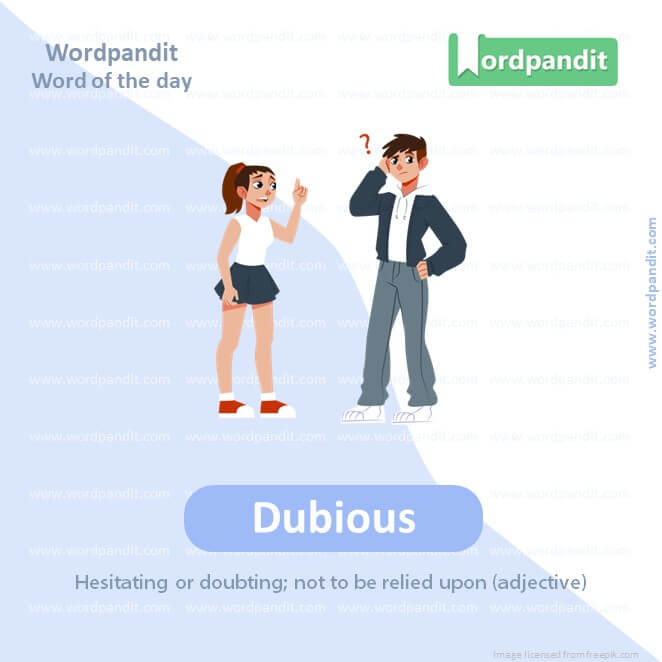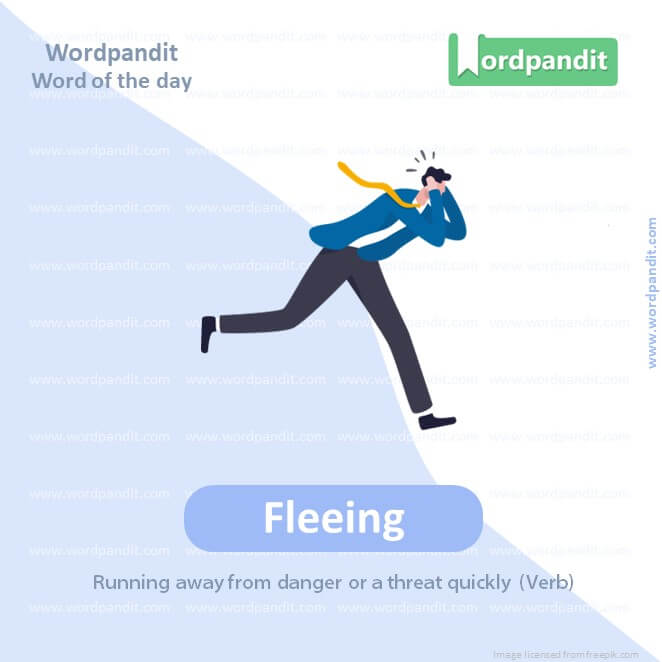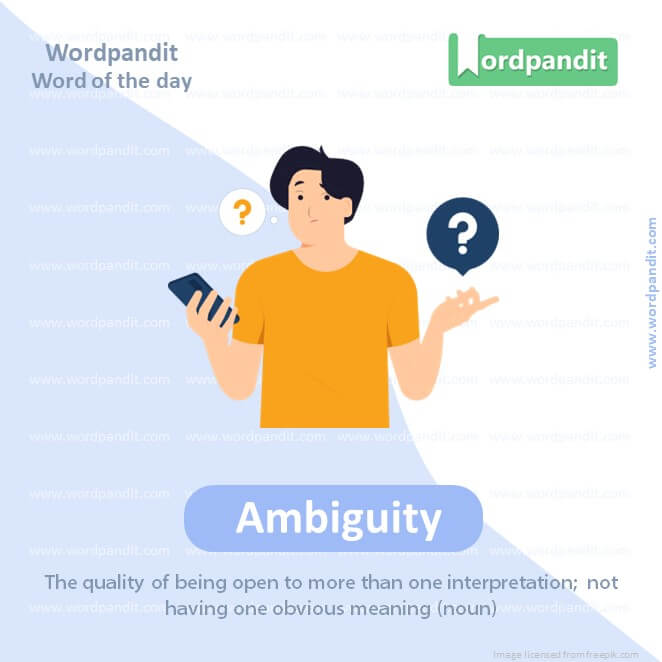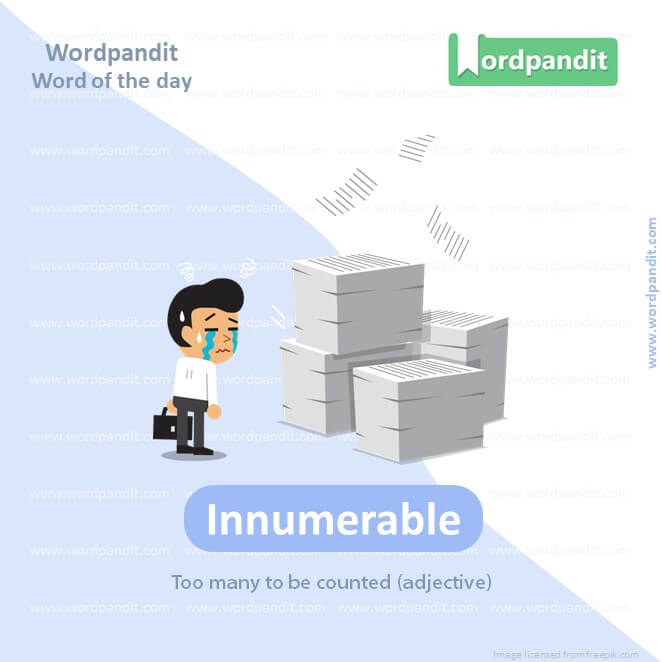Daily Vocabulary Words: List of Daily Used Words in Leading International Newspapers
Hi there. Welcome to this special section @ Wordpandit.
Our endeavour here is very simple: to highlight important daily vocabulary words, which you would come across in leading newspapers in the country. We have included the following newspapers in our selection:
• The New York Times
• The Washington Post
• Scientific American
• BBC
• The Guardian
• Psychology Today
• Wall Street Journal
• The Economist
We are putting in extensive work for developing your vocabulary. All you have got to do is be regular with this section and check out this post on a daily basis. This is your repository of words that are commonly used and essentially, we are posting a list of daily used words. Hence, this has significant practical application as it teaches you words that are used commonly in leading publications mentioned above.
Visit the website daily to learn words from leading international newspapers.

WORD-1: Dubious
CONTEXT: the Texas National Guard in response, such a move would be legally dubious on its own and would serve only to escalate the political conflict.
SOURCE: New York Times
EXPLANATORY PARAGRAPH: Dubious is like when you’re not sure about something and you have a questioning look on your face. It’s about being uncertain or doubtful, like when you’re not sure if the weather will be good for a picnic.
MEANING: Hesitating or doubting; not to be relied upon (adjective).
PRONUNCIATION: doo-bee-uhs
SYNONYMS: uncertain, doubtful, questionable, suspicious, skeptical, hesitant, unclear
USAGE EXAMPLES:
1. The witness gave a dubious explanation that raised concerns.
2. The project’s success remained dubious due to lack of funding.
3. His dubious response left the audience wondering about his sincerity.
4. The politician’s dubious actions sparked a controversy.
WORD-2: Injunction
CONTEXT: the Supreme Court did last week was to wipe away, with no explanation, a lower-court injunction that was effectively barring federal officials from removing the razor wire that Texas had placed along the border.
SOURCE: New York Times
EXPLANATORY PARAGRAPH: Injunction is like a rule or order that says, “Stop! Don’t do that!” It’s about preventing someone from doing something, like a teacher giving an order to stop talking in class.
MEANING: A court order that prohibits or compels a specific action; a directive or command. (noun)
PRONUNCIATION: in-juhngk-shuhn
SYNONYMS: order, command, directive, mandate, prohibition, restraining order, decree
USAGE EXAMPLES:
1. The court issued an injunction to prevent further environmental damage.
2. The company faced legal consequences for violating an injunction.
3. The judge granted an injunction to halt construction on the disputed land.
4. The artist received an injunction to stop reproducing copyrighted works.
WORD-3: Disincentivize
CONTEXT: A real solution depends on striking a national balance between trying to disincentivize and deter unauthorized entry into the country and treating those who nevertheless attempt such entry as fellow humans.
SOURCE: New York Times
EXPLANATORY PARAGRAPH: Disincentivize is like taking away the reward or treat for doing something, making it less appealing. It’s about making an action less attractive or rewarding.
MEANING: To discourage or reduce the motivation or desire for a particular action. (verb)
PRONUNCIATION: dis-in-sen-tuh-vahyz
SYNONYMS: discourage, deter, dissuade, devalue, demotivate, undermine, disincline
USAGE EXAMPLES:
1. Higher taxes on unhealthy foods aim to disincentivize unhealthy eating habits.
2. The company implemented measures to disincentivize excessive absenteeism.
3. Governments may use policies to disincentivize harmful environmental practices.
4. The reduction in rewards can disincentivize employees from putting in extra effort.

WORD-4: Incarceration
CONTEXT: the criminalization of drugs as a way to discredit both groups, helping to usher in the war on drugs and mass incarceration, which have been catastrophic for the Black community.
SOURCE: New York Times
EXPLANATORY PARAGRAPH: Incarceration is like when someone has to go to a time-out corner but for grown-ups. It’s about being confined or locked up, like when someone breaks the rules and has to spend some time away from others.
MEANING: The state of being confined in prison (noun).
PRONUNCIATION: in-kahr-suh-rey-shuhn
SYNONYMS: imprisonment, confinement, detention, custody, incarceration, internment, imprisonment
USAGE EXAMPLES:
1. The court sentenced the criminal to years of incarceration for the robbery.
2. Incarceration is one possible consequence for serious criminal offenses.
3. The documentary explored the impact of incarceration on individuals and families.
4. Some argue for alternative forms of punishment instead of incarceration.

WORD-5: Fleeing
CONTEXT: there would come the violent backlash of the Red Summer, as bloody riots targeting Black Americans broke out, some taking place in cities to which Black people had migrated, lured by the promise of better economic and social conditions, and fleeing racial terrorism.
SOURCE: New York Times
EXPLANATORY PARAGRAPH: Fleeing is like running away from something quickly, like when you play tag and want to avoid being caught. In real-life situations, it means running away from danger or a difficult situation.
MEANING: Running away from danger or a threat quickly (Verb).
PRONUNCIATION: flee-ing
SYNONYMS: escaping, running away, departing, evading, eluding, absconding, retreating
USAGE EXAMPLES:
1. The characters in the movie were fleeing from the advancing enemy.
2. Fleeing the burning building, the residents sought safety outside.
3. The refugees were fleeing their war-torn homeland in search of safety.
4. Fleeing from a dangerous situation requires quick thinking and agility.
WORD-6: Impeached
CONTEXT: The racists took control of the state’s legislature and judiciary, impeached the Republican governor and installed a replacement of their liking.
SOURCE: New York Times
EXPLANATORY PARAGRAPH: Impeached is like when someone is accused of breaking the rules, especially if they are in a powerful position. It’s like being called out for not playing fair.
MEANING: Accused or charged with misconduct, typically against the duties of a public office. (verb)
PRONUNCIATION: im-peechd
SYNONYMS: accused, indicted, charged, censured, denounced, criticized, reproached
USAGE EXAMPLES:
1. The president faced impeachment proceedings for alleged corruption.
2. The governor was impeached on charges of abuse of power.
3. Impeached officials may undergo a trial to determine guilt or innocence.
4. Impeachment is a constitutional process for holding leaders accountable.

WORD-7: Ambiguity
CONTEXT: a social scientist at Harvard who studies how technology is shaping adolescents’ lives, notes that it’s the ambiguity that can make this kind of aggression so much more insidious, leading to a “perpetual state of second- and third-guessing.”
SOURCE: New York Times
EXPLANATORY PARAGRAPH: Ambiguity is like when something is not very clear, and you’re not sure what it means. It’s about having more than one possible interpretation or meaning.
MEANING: The quality of being open to more than one interpretation; not having one obvious meaning (noun).
PRONUNCIATION: am-big-yoo-i-tee
SYNONYMS: vagueness, uncertainty, obscurity, indistinctness, equivocalness, haziness, confusion
USAGE EXAMPLES:
1. The legal document was criticized for its ambiguity in key clauses.
2. Ambiguity in the instructions led to confusion among the team.
3. The author intentionally used ambiguity to create suspense in the story.
4. Resolving ambiguity in communication is essential for effective understanding.
WORD-8: Embodied
CONTEXT: Much of this was embodied by the state of Mississippi, which in 1870 was majority Black
SOURCE: New York Times
EXPLANATORY PARAGRAPH: Embodied is like when you become the character in a game, acting and feeling just like them. In a broader sense, it means representing or expressing something in a tangible form.
MEANING: Represented or expressed in a tangible or physical form. (verb/adjective)
PRONUNCIATION: em-bod-eed
SYNONYMS: incarnated, manifested, represented, personified, exemplified, expressed, typified
USAGE EXAMPLES:
1. The painting embodied the artist’s emotions and creative vision.
2. Her actions embodied the values of kindness and generosity.
3. The character in the play embodied the struggles of an entire generation.
4. The sculpture beautifully embodied the essence of grace and strength.

WORD-9: Innumerable
CONTEXT: The hallmarks of relational aggression are things like cutting friends out, spreading rumors or exclusion, today’s technology has created innumerable new ways to enact that adolescent torture.
SOURCE: New York Times
EXPLANATORY PARAGRAPH: Innumerable is like having so many toys that you can’t count them all. It’s about having too many to count or quantify.
MEANING: Too many to be counted (adjective).
PRONUNCIATION: ih-noo-mer-uh-buhl
SYNONYMS: countless, innumerous, myriad, limitless, uncountable, untold, immeasurable
USAGE EXAMPLES:
1. The night sky was filled with innumerable stars.
2. The task generated innumerable challenges that needed to be addressed.
3. Innumerable opportunities awaited those willing to explore new horizons.
4. The museum displayed artifacts from innumerable cultures and time periods.
WORD-10: Unflattering
CONTEXT: Stealth meanness can be as covert as tagging someone in an unflattering photo or as clever as posting a celebratory birthday post for your bestie
SOURCE: New York Times
EXPLANATORY PARAGRAPH: Unflattering is like when someone takes a picture of you when you’re not ready, and you don’t look your best. It’s about showing something or someone in a way that doesn’t make them look good.
MEANING: Not showing someone or something in a favorable or attractive light. (adjective)
PRONUNCIATION: uhn-flat-er-ing
SYNONYMS: unfavorable, uncomplimentary, unsightly, unattractive, disparaging, critical, unappealing
USAGE EXAMPLES:
1. The unflattering review criticized the film’s plot and performances.
2. The candid photograph captured an unflattering moment during the party.
3. The article presented an unflattering portrayal of the political candidate.
4. Despite the unflattering comments, the artist remained confident in their work.
Vocabulary Pronunciation
The dance of language learning comprises two inseparable partners: vocabulary and pronunciation. The rhythm of this dance is best enjoyed when both partners are in sync. Essentially, mastering ‘vocabulary pronunciation’ is key to expressing and understanding a language effectively. However, what is the ideal approach to learn ‘vocabulary pronunciation’?
Firstly, the process of learning ‘vocabulary pronunciation’ isn’t a sprint. Rather, it’s a marathon where consistency is vital. A gradual and steady pace of learning new words and their pronunciation offers enough time to effectively practice and commit them to memory.
Secondly, to master ‘vocabulary pronunciation’, go beyond written text. Dwell in the world of audible language, such as documentaries, podcasts, music, or language-learning apps that provide pronunciation guides. These memorable auditory experiences aid in refining your ‘vocabulary pronunciation’ and offer a glimpse into the authentic sounds of the language.
Another beneficial strategy for learning ‘vocabulary pronunciation’ involves the use of phonetic transcriptions. They offer systematic approaches to understanding the sound system of a language, thereby improving pronunciation. a Most importantly, do not shy away from practicing your ‘vocabulary pronunciation’. Be it in a language exchange meeting, a conversation with a native speaker, or even a self-recording session, active verbalization massively boosts your pronunciation prowess.
Lastly, always remember to train your ears as much as you train your tongue. Listening carefully to native speakers helps you capture the subtleties of ‘vocabulary pronunciation’, contributing to better delivery when you speak.
In conclusion, mastering ‘vocabulary pronunciation’ is not an overnight journey. It’s a process of intentional practice, sustained listening, conscientious reflection and active usage. As you chart this course with diligence and patience, you will witness your ‘vocabulary pronunciation’ skills blossom, leading you to communicate with greater fluency and confidence.











